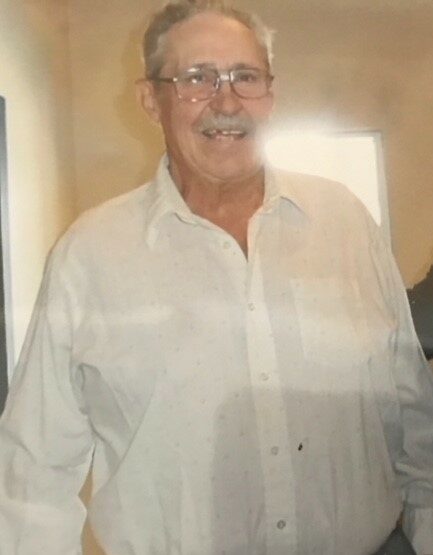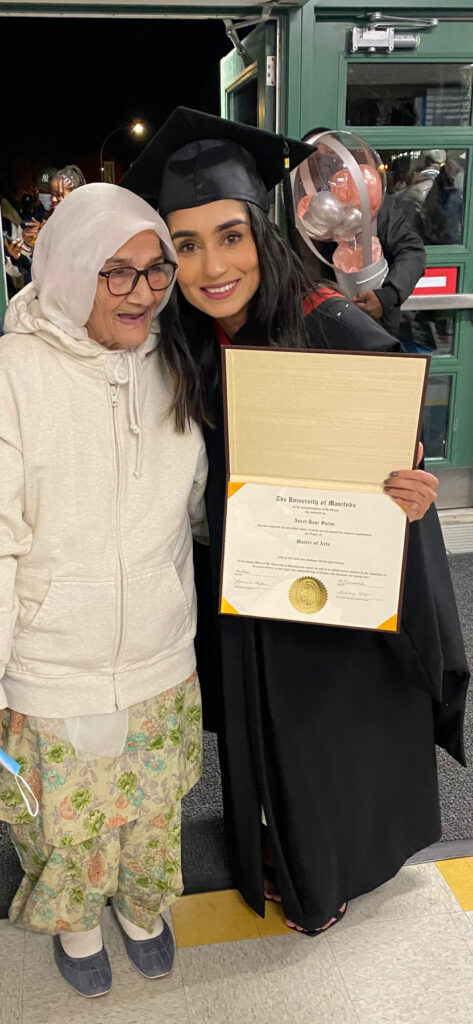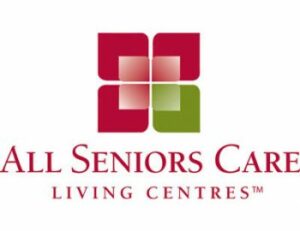Are you struggling to figure out your next steps? Our First Link® Client Support team is here to listen and help guide you through difficult times – from when you are concerned about your own, a family member or friend’s memory, right through to the later symptoms of dementia. Call us today at 204-943-6622/1-800-378-6622 or fill out our online form and we will reach out to you.
February Highlights
- Landmark Study: The Many Faces of Dementia in Canada
- Vascular Dementia Awareness
- Ron’s Gift
- Graduate Student Awarded Funding
Program News
The Many Faces of Dementia in Canada
The Alzheimer Society of Canada recently released the second in a series of three reports that make up the Landmark Study – a microsimulation study developed by the Alzheimer Society of Canada to better understand dementia and its prevalence in Canada over the next 30 years.
“The Many Faces of Dementia in Canada” unpacks the diversity behind dementia, showing who will likely develop dementia over the next few decades. This is one of the first studies that seeks to better understand the many faces of dementia so that no one is left behind and we can serve their specific needs and those in their circle of care.
Understanding the unique needs and experiences of diverse communities is a key step in improving the quality of life for people living with dementia and their caregivers.
Click here to view the full report
Click here to view the Provincial Data Report for Manitoba
Vascular Dementia Awareness
 Dementia is an overall term for a set of symptoms that are caused by disorders affecting the brain. Alzheimer’s disease is the most common type of dementia but there are several others. At the Alzheimer Society, we provide information and support for all types of dementia.
Dementia is an overall term for a set of symptoms that are caused by disorders affecting the brain. Alzheimer’s disease is the most common type of dementia but there are several others. At the Alzheimer Society, we provide information and support for all types of dementia.
This month, we’re highlighting vascular dementia, the most common type of dementia behind Alzheimer’s disease. Vascular dementia occurs when the brain’s blood supply is blocked or damaged, causing brain cells to die from lack of oxygen.
Vascular dementia often occurs alongside Alzheimer’s disease or other brain diseases. Symptoms of vascular dementia include:
- Changes in thinking skills, such as reasoning, planning, judgement and attention
- Changes abilities that are significant enough to interfere with daily social or work functioning
Symptoms tend to appear slowly. Specific impairments may occur in steps, where abilities deteriorate, stabilize for a time and then decline again.
Stroke is a common cause of vascular dementia. Recognizing the signs of stroke and acting quickly can make a difference in recovery and in lowering the risk of dementia.
Treating the risk factors for stroke also significantly reduces your risk of vascular dementia. Hypertension, or high blood pressure, is the single most important risk factor for stroke and vascular dementia that can be controlled. Overall, living a brain and heart-healthy lifestyle is the main way to reduce your risk of dementia.
You can learn more about dementia risk reduction here: Reduce Your Risk | alzheimer.mb.ca.
If you have questions about vascular dementia or are looking for other dementia support, reach out to our First Link Client Support team anytime by calling 204-943-6622 (Winnipeg) / 1-800-378-6699 (toll-free in Manitoba) or emailing [email protected]. We’re always here to help.
Ron’s Gift
Sometimes, someone you’ve never even met can make a huge difference in your life.
Ronald Jackson is one of these people – and his generosity made a difference for thousands of Manitobans affected by dementia.
In late 2019, Ron passed away suddenly at age 74. His will left generous gifts to several charities, including the Alzheimer Society of Manitoba.
“Your will is powerful,” says Christine Van Cauwenberghe, head of financial planning at IG Wealth Management. “You can make a bigger difference than you realize. By giving even a small portion of your estate to charity, you can make a significant impact on the causes you care about while still supporting those you love.”
Ron was a cattle rancher from Langruth. He loved to fish, hunt, garden and bake – he always brought a freshly baked cake to a close neighbour on their birthday. Although he and his trusted dog lived on their own, he was very close to his friends, neighbours and family.
“He was also an excellent cook and even canned his own vegetables,” says Barbara, Ron’s sister. “Back when he used to hold Thanksgiving, he’d cook dinner for about 40 people and would make something different for us each year.”
Feeding his family and friends and working hard for his neighbours and community were important parts of life for Ron. Barbara believes Ron’s love for the people close to him inspired the gifts he left in his will.
“Our mother had Alzheimer’s – she and Ron were very close. That’s why we think he left a gift to the Society,” Barbara explains. “It was hard for him to see her facing dementia and the changes it caused. She didn’t recognize most people after a while, including me. But she always knew Ron when he came to visit and ask how his garden was doing.”
“The truth is, you could be using your will to do a lot more,” says Christine. “For example, a charitable gift in your will can go a long way toward reducing the amount of taxes against your estate after you pass.”
For more information about the power of your will, visit the Will Power website. You can also check out the article Why You Should Leave a Charitable Gift In Your Will – Will Power.
Graduate Student Awarded Funding for Research on Motor Imagery
Motor imagery is a tool our brains use to help us move around in our daily lives. It’s the brain’s way of rehearsing movements before we perform them. Each time we imagine an action, we activate the same brain regions involved in physical movement.
Research shows that for people living with dementia, the ability to perform everyday movements, like picking up a cup of coffee from a cluttered kitchen table, can be compromised. Being able to move and perform daily actions is an important part of maintaining quality of life. This is why researchers like Aneet Saran are investigating ways to improve motor function in older adults, with and without a dementia diagnosis.
Aneet is a graduate student at the University of Manitoba working in Brain & Cognitive Sciences and is a recipient of the 2023-24 Alzheimer Society of Manitoba Fellowship, an award presented to graduate students doing remarkable work in the dementia research field. Her current research focuses on motor imaging and its potential to help those living with dementia improve everyday movements.
“We believe practicing motor imaging can be used to reduce the physical demands of actual movement and improve motor performance for people living with dementia,” says Aneet. “Motor imaging techniques could also help restore muscle strength.”
Part of Aneet’s research included working with a group of healthy older adults to test the usefulness of motor imagery in object identification. This group looked at a series of images showing hands in different positions and angles. They then had to determine whether the hand was right or left.
“Essentially, they imagine themselves rotating their hands in particular orientations to help them identify the hand in the image,” Aneet says. “The more complex the orientation, the longer it took for participants to respond and the more errors they made.”
The next step in this research is to do the same test with participants living with dementia and see how the results compare.
Aneet is now in the second year of her Ph.D. and wants to continue her work with motor imagery. She hopes to eventually create a rehabilitation program for older adults, including those living with dementia, based on motor imaging and prioritizing both mental and physical health.
“I’ve always been interested in aging research. I’m the primary caregiver of my grandparents and realized there was limited research out there on healthy older adults – even less so for those living with dementia,” says Aneet. “There’s a big need for more research and resources to help aging adults.”
Aneet says research funding like the Alzheimer Society’s Fellowship award is important because there isn’t a lot of funding available for research focusing on Canada’s 65+ population.
“In Canada, we have a lot of individuals over the age of 65, and this population adds a lot of value to our communities,” Aneet says. “There needs to be more resources, more guidance and most of all, more funding of age-related research so we can get a better understanding of the challenges this population faces, including dementia.”
Step Into the 1800s With This New Dementia-Friendly Program
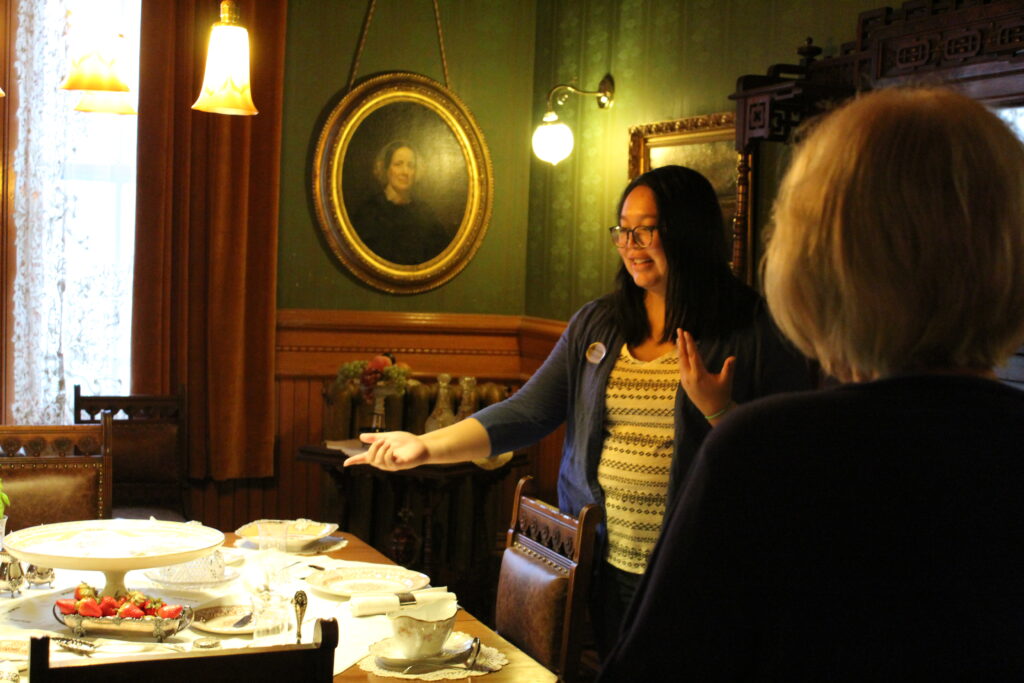 Take a journey back in time to the Victorian era with our newest dementia-friendly community program. We’re partnering with Dalnavert Museum and Visitors’ Centre to give people living with mild to moderate signs of dementia and their care partners the unique opportunity to step back through the centuries and engage with history.
Take a journey back in time to the Victorian era with our newest dementia-friendly community program. We’re partnering with Dalnavert Museum and Visitors’ Centre to give people living with mild to moderate signs of dementia and their care partners the unique opportunity to step back through the centuries and engage with history.
“Museums are stewards of culture and history and play an active role in informing the future – I think it’s really important that these are inclusive spaces everyone can access,” says Samantha Machado, Museum Services Manager and Acting Executive Director, Dalnavert Museum and Visitors’ Centre.
Built in 1895, Dalnavert is a Victorian mansion preserved in time, furnished and decorated as it would have been back in the 19th century. The mansion was home to the Macdonald family: Hugh John Macdonald (son of Canada’s first Prime Minister, Sir John A. Macdonald), his wife, Lady Agnes and two children, Isabella “Daisy” and John “Jack”. It’s now a national historic site and one of the finest examples of Queen Anne Revival architecture in Western Canada.
Beginning this February, the program at Dalnavert Museum will be offered once a month and includes a dementia-friendly tour of the museum, which takes participants through the historic house, viewing the artifacts and discussing a bit of the history behind them. Afterwards, participants can enjoy tea and coffee, chat about the museum’s collections in more detail and get a closer look at artifacts.
The program will run the last Saturday of every month, starting February 24 from 10 – 11:30 am. The cost for one session is $24.00 (plus tax) per pair and $12.00 per pair if one in the pair is a Dalnavert Museum Member.
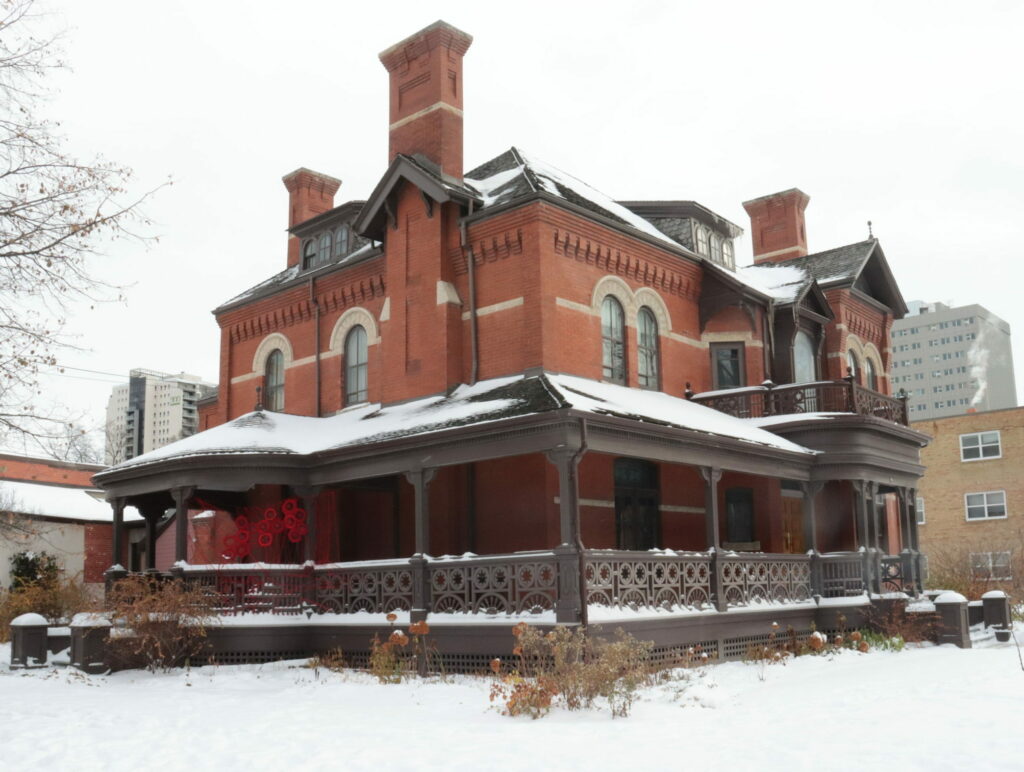 “Dalnavert is a historic house as well as museum, so when you step inside it really feels like you’re back in 1895,” Samantha says. “The artifacts may remind people living with dementia of a certain time or moment from the past, another important reason to make museum visits more accessible for all.”
“Dalnavert is a historic house as well as museum, so when you step inside it really feels like you’re back in 1895,” Samantha says. “The artifacts may remind people living with dementia of a certain time or moment from the past, another important reason to make museum visits more accessible for all.”
A few adjustments will be made to the museum’s tour to help make it dementia-friendly. Samantha notes that seating will be added throughout the house for participants to use during the tour and flashlights will be provided as some of the spaces in the house can be a little dark. The upper floors of the house are only accessible by stairs, so if stairs are a challenge to any participants, there will be the option to explore these upper floors through a virtual tour, guided by a Dalnavert volunteer.
This program not only gives participants a chance to explore some of Manitoba’s history, but also provides an opportunity to connect with others going through similar experiences with dementia.
To register for a dementia-friendly tour, visit the Dalnavert Museum and Visitors’ Centre website.
Register Today for Tales Along the Trail
Are you looking for some winter activities to help get you out and moving? FortWhyte Alive’s Tales Along the Trail is a great way for people living with dementia and their care partners to explore the Manitoba prairie winter landscape with an experienced naturalist and connect with others who are also living with dementia. There are still spots available for the 2024 Winter program sessions – so don’t wait to register!
 Each session includes a relaxing walk through the woods, with stops focusing on all of your senses. You’ll then have a chance to share thoughts, stories, and a snack around a crackling fire or cozy indoor space.
Each session includes a relaxing walk through the woods, with stops focusing on all of your senses. You’ll then have a chance to share thoughts, stories, and a snack around a crackling fire or cozy indoor space.
Winter Program (8 weeks)
Wednesdays, 2 – 3:30 pm
January 24, 31, February 7, 14, 21, 28, March 6, 13, 2024
Cost: $110 + GST/pair (Fees will be pro-rated if joining for February & March sessions)
Register today by contacting [email protected].
Minds in Motion® Winter Sessions
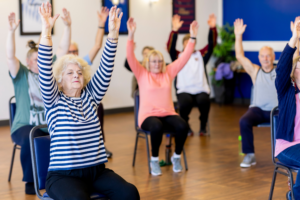 Keep socially and physically active this winter with Minds in Motion®!
Keep socially and physically active this winter with Minds in Motion®!
Our popular Minds in Motion® program connects people living with early to moderate signs of dementia and their care partners through fitness, fun and friendship. Participants take part in a gentle chair fitness class followed by socially engaging activity and conversation. There are lots of laughs and social interaction during these sessions.
It’s not too late to join our Winter program! See below for session locations, dates, times and registration information, or visit alzheimer.mb.ca/mindsinmotion.
Winnipeg Locations
Faith Lutheran Church – 1311 Dakota St.
Thursdays, 10 am – 12 pm
Jan 25 – Mar 14
Registration is Closed!
To inquire about Spring 2024 registration, please email [email protected].
Rady JCC Fitness Centre – 123 Doncaster St.
Wednesdays, 10 am – 12 pm
Jan 24 – Mar 13
Call to register: 204-477-7510
Riverwood Square – 1778 Pembina Hwy.
Tuesdays, 10 am – 12 pm
Jan 23 – Mar 12
Registration is Closed!
To inquire about Spring 2024 registration, please email [email protected].
The Wellness Institute – 1075 Leila Ave.
Wednesdays, 1:30 – 3:30 pm
Jan 24 – Mar 13
Call to register: 204-632-3900
YMCA – Elmwood-Kildonan – 454 Kimberly Ave.
Thursdays, 1:30 – 3:30 pm
Jan 25 – Mar 14
Call to register: 204-668-8140
YMCA – West Portage – 3550 Portage Ave.
Tuesdays, 1 – 3 pm
Jan 23 – Mar 12
Registration is Closed!
To inquire about Spring 2024 registration, please email [email protected].
Regional Locations
ALTONA
The Gardens on Tenth – 140 10 Ave. NE
Mondays, 1:30 – 3:30 pm
Jan 8 – Mar 4
NO SESSION FEB 19
Call to register: 1-204-324-8945
BRANDON
Seniors for Seniors – 311 Park Ave. East
Thursdays, 1:30 – 3:30 pm
Jan 25 – Mar 14
Call to register: 1-204-571-2050
CARMAN
Carman Active Living Centre – 47 Ed Belfour Dr.
Fridays, 1 – 3 pm
Jan 12 – Mar 8
Call Linda to register: 1-204-745-2356 or email [email protected]
PORTAGE LA PRAIRIE
Herman Prior Centre – 40 Royal Rd. North
Wednesdays, 1:30 – 3:30 pm
Jan 24 – Mar 13
Registration is Closed!
To inquire about Spring 2024 registration, please email [email protected].
STEINBACH
Pat Porter Active Living Centre – 10 Chrysler Gate
Wednesdays, 10 am – 12 pm
Feb 7 – Mar 27
Call to register: 1-204-320-4600
Call for Minds in Motion® Volunteers!
If you’re someone who enjoys giving back to the community and volunteering your time, we’re looking for more Minds in Motion® volunteers!
Our volunteers are an integral part of the program. As a volunteer, you’ll help set up the space for participants, deliver and participate in programming and make meaningful connections with people who are living with dementia.
Ideally, we ask for a 1-year commitment from volunteers, to help throughout the fall, winter, and spring sessions. Volunteers commit 3-hours once a week for the 8-week program, three times in the year.
We’re looking for volunteers for a variety of program locations, both in Winnipeg and regional areas. Visit our Minds in Motion webpage to learn more about the program and view current locations.
For more information or to request a volunteer application form, contact Alana Duff, Dementia-Friendly Community Coordinator at [email protected].
Understanding Our Bereavement Support Group
There is something unique about dealing with the loss of someone who lived with dementia. Often, care partners have already been losing this person slowly, and then when they are physically gone, the loss can be further complicated by other feelings that may not have been resolved.
Nothing can replace the understanding and validation that comes from a group of people experiencing similar circumstances. ‘I’ve been there, I hear you,’ means so much more coming from someone who is going through it themselves.
Our Bereavement Support Group helps people work through these intricate and confusing feelings in a safe space led by facilitators who have the knowledge and expertise needed to understand the complications dementia brings to the grieving process.
“We establish an atmosphere of mutual respect and confidentiality during that first session,” says Thomas Steur, First Link® Client Support Coordinator and one of the facilitators of the group. “We all agree not to judge ourselves or other people, which helps set the tone for the rest of the sessions.”
The group is together for nine sessions with a different topic of discussion each week. It’s a balance of open conversation and education, including some tips and strategies on how to cope.
A challenging misconception that group members talk about is the feeling that their friends or family think they have already done their grieving. There’s an idea that the anticipatory grief that comes with dementia somehow prepares a care partner to navigate the death of the person more easily.
“This is not true,” says Thomas. “A loss is a loss. A death is a death. Your experience is valid and what you are going through is yours and yours alone. There is no time frame or specific stages you have to go through to heal.”
Feelings of guilt can also come up for care partners when experiencing the loss of someone living with dementia. Some may question the decisions they made while caregiving or wonder whether or not they provided enough support.
“Often death is far from being a relief, in fact, things can become even more complicated when someone has additional time to address feelings they may have put aside,” explains Thomas. “That’s what we’re here for, to help people process these difficult feelings.”
Care partners can also be left with an overwhelming feeling of loneliness. When you lose someone who was living with dementia, you also lose their support team – their doctor, homecare coordinator, health-care workers or long-term care staff.
“It can feel like the rug is pulled right out from under you,” describes Thomas. “We just want people to know they are not alone and whatever they go through next, we continue to be there for them.”
Our next Bereavement Support Group is anticipated to run this spring. For more information about this group and to register, please contact the Alzheimer Society at 204-943-6622 (Winnipeg), 1-800-378-6699 (Manitoba) or [email protected].
All of our support groups are inclusive environments for people of different ethnicities, cultures or persons who identify as part of the 2SLGBTQ+ community.
Join Our Winter Education Sessions
 Come join us this winter and learn about a variety of topics including life in long-term care, complex legal situations and more. These sessions are free to attend and offered via Zoom.
Come join us this winter and learn about a variety of topics including life in long-term care, complex legal situations and more. These sessions are free to attend and offered via Zoom.
Here’s what’s coming up:
Navigating Grief – Sponsored by Johnston Group and Payworks
Dr. Lesley Koven is back! In follow up to Dr. Koven’s discussion of Ambiguous Loss at Care4U 2023, this session will explain the various ways in which one may experience feelings of grief and loss when someone living with dementia transitions into long-term care or passes away. Become familiar with the signs of grief, the factors that may complicate the feelings and gain an understanding of various coping strategies for living with it.
Tuesday, February 20 | 10 – 11 am | Virtual via Zoom
Click here to register
Living With Dementia: First Steps – Part 3
*Please note you do not need to attend these in order.*
The third session of a three-part information series for people supporting someone recently diagnosed with dementia.
Learn from health and industry professionals as they discuss the disease progression and provide information on services and resources available. In this webinar, learn more about the WRHA Home Care Services Overview.
Saturday, March 2 | 10 – 11:45 am | Virtual via Zoom
Click here to register
Visit the link below for more details on all our upcoming winter education sessions and to register.
Family Education | Upcoming Seminars
Family Education: Next Steps Sponsored by:
Dementia Care Professional Development Series: The Complex World of Dementia Care
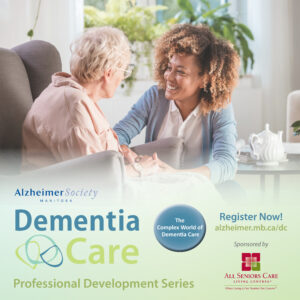
Join us for our Dementia Care 2023-2024 Professional Development Series! Sessions are geared towards health care staff and community service providers and take place online monthly until March 2024.
Our next session titled, Dos & Don’ts of Medication Management in Dementia takes place on Thursday, February 15 from 2 – 3 pm. There are many things to consider when learning about or helping to manage the medication for a person with dementia. In this session:
- hear about the risks and benefits of some of the common practices related to medication administration, including crushing pills and mixing medicine with food/juice
- explore communication strategies and safety precautions to use when someone living with dementia is unable to keep track of their medication regimen
- get updates on the use of psychotropic medications in older adults
- learn about alternative treatment options
- find out more about available resources
For only $30, you get access to all virtual sessions!
We encourage anyone working with people living with dementia in the community, hospitals or personal care homes to register. These sessions add up to 30 completed hours of education that may be used towards professional development or continuing education hours.
Visit the Dementia Care website to learn more about all the sessions, speakers and to register now!
This event is sponsored by:
Follow Us On Social Media
Join us on Facebook, Instagram, LinkedIn and X (formerly Twitter) for the most current news, information and resources. If you’re already following us on social media, invite your friends to do the same!
X (formerly Twitter)
We Rely on Your Donations to Continue Our Work

Your gifts are put to immediate use through our helpline, support groups and education programs.
Remember. You Are Not Alone.
We are here to help you and your family no matter where you are in your dementia journey. You can reach a comforting ear by phone or get a quick response by email. Call us at 204-943-6622 (Wpg), 1-800-378-6699 (MB) or email [email protected]


